-
Posts
2,406 -
Joined
-
Last visited
Content Type
Profiles
Forums
Gallery
Events
Articles
Posts posted by Ian
-
-
this one was struck for `La Reassurances' (fire risk)
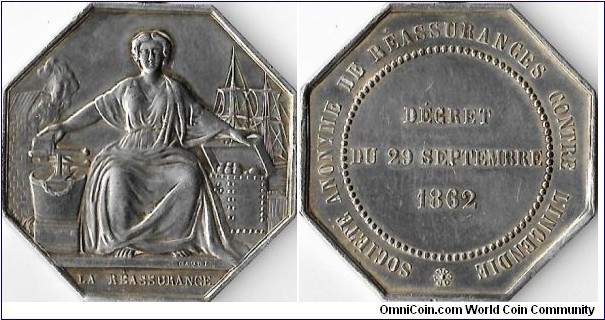
-
This one is from the life assurance company `Credit Viager'
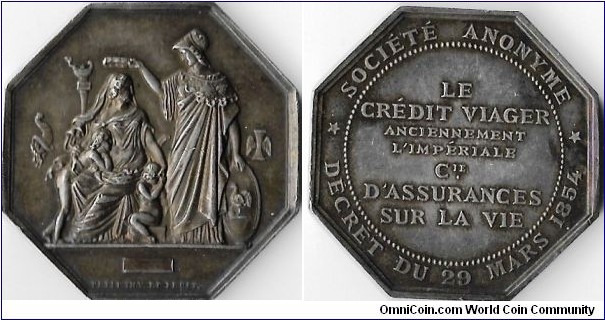
-
-
...approx 10mm at the widest.
-
The jetons of La Compagnie D'assurances Generales a Paris are fairly common and readily found on ebay, but there are numerous variants (size of the jeton; variants to the reverse legends; different mint mark /edge markings). This example is an `error' variant , in that the date under the bust (obverse) should have been 1818 (MDCCCXVIII) thatis, the date the company was inaugurated. Instead, it is dated 1813 (MDCCCXIII), that is, it is missing a `V'.
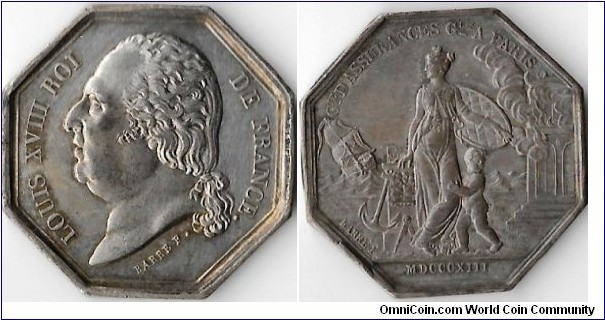
-
It's silver and, although unlikely to have circulated as a cash item, it has always had a monetary value dependent upon the market value of silver at any given time. I could see it being a `pocket piece' or indeed being passed off as an item of exchange if the owner came upon hard times.
-
I''ll dig out an example of the `half puffin' coin. The reverse image is literally half a puffin

-
true story. When I was about 12 yrs old, I actually received a well worn roman silver denier in my change (the shopkeeper thought it was a sixpence....so did I at the time of exchange).
i wonder....would anyone back in Roman times argue much about being presented with a large slug of silver for payment (?).....irrespective of what was stamped on it.....
-
...almost scared to post anything in this thread as the examples that Bill has posted are truly beautiful examples...
However, thankfully there are budget examples available on the market (ie within my budget :)). here's a few examples i've managed to acquire...warts and all.
The first is an obol from Chateaudun (as far as i can determine that is). Roberts places it 13th Century
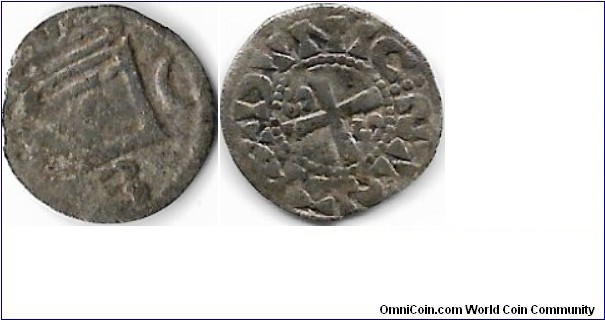
The second is from Blois 10th / 11th centuries ad
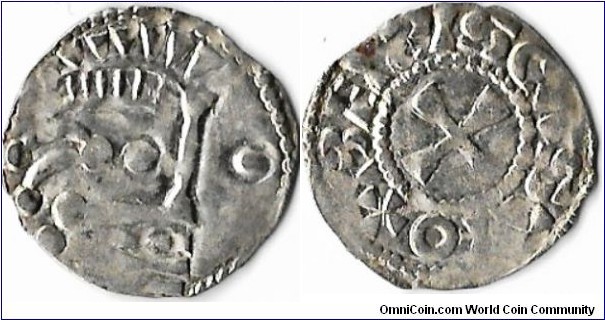
The third is from Chartres circa 10th /11th centuries ad
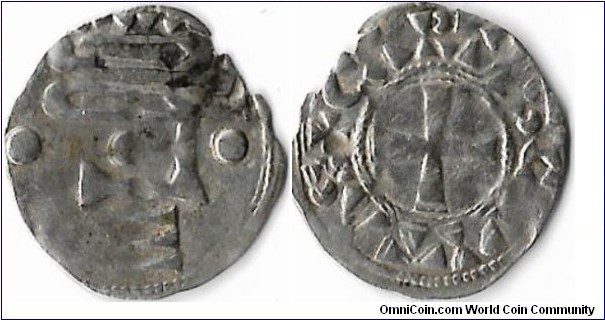
-
This one is Celtic /Roman type with bust (off centre) to the right. Struck Circa 100 bc.
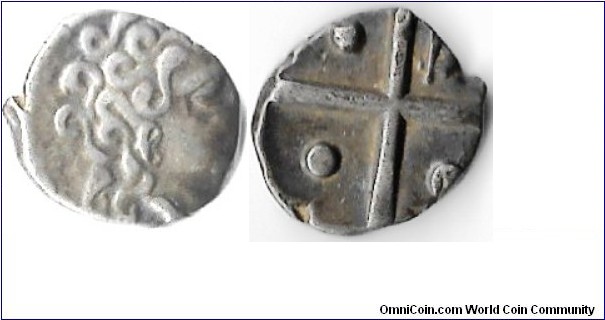
-
....this one struck for La Banlieu, another French Assureur
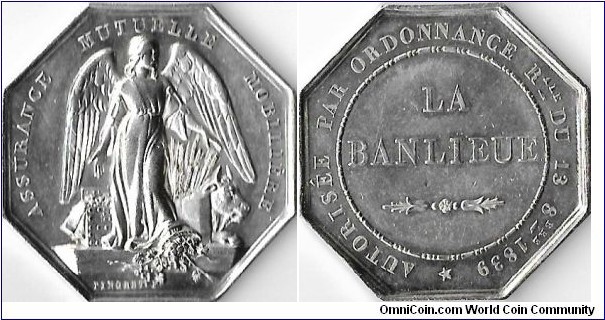
-
-
Lower grade example of jeton struck for `La Melusine', another french maritime assurer
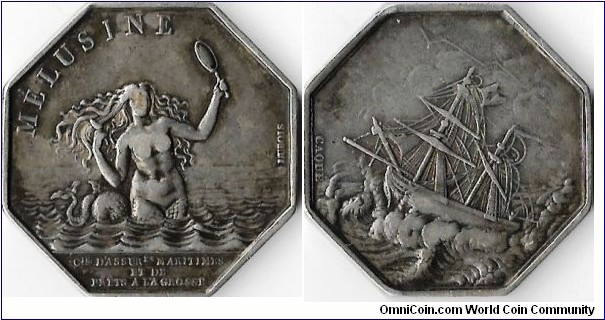
-
high grade example of an Obol of the Perrhaebi tribe (Thessaly) struck circa 480 - 400 BC.
Ref: BMC4 / SG 2171
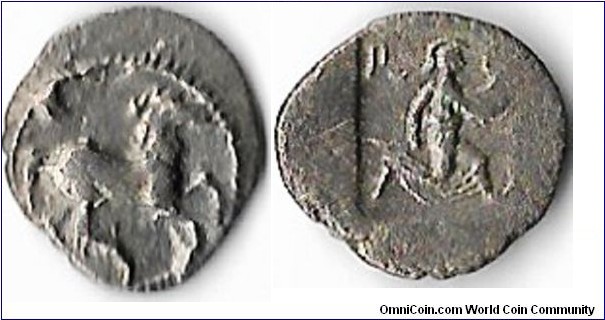
-
This one struck for `La Maritime' sometime between 1870 and 1880
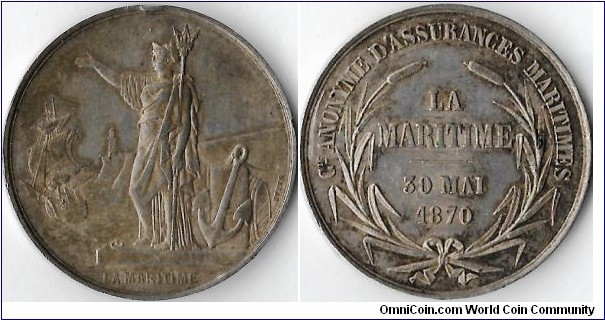
-
Just a bit of lightheartedness and to show one of my favourite pieces....a Lundy `Puffin'. Not strictly speaking a `coin of the realm' though

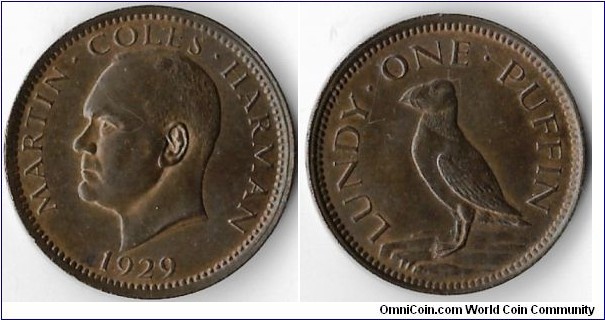
-
Silver Tetradrachm (15.54 gms) struck for Ptolemy I (Soter) as Satrap of Egypt circa 310 /305 BC. The scan below doesn't do the coin much justice but its as good as I can get it.
Obverse has bust of Alexander the Great wearing elephant headdress. A very cleanly struck neat `omega' character countermark has been added to the right of Alexander's chin at some point in antiquity.
Reverse shows Athena walking to right sporting a spear and shield with an eagle in the lower right field. There are three monograms. one in the left field and two in the right. Sadly, I have no idea what these are in terms of their significance. The reference I have been given is Copenhagen 18. The closest i've seen to this is on Wildwinds as Copenhagen 18 variant, but their one only has the one monogram. Any information would be gratefully received

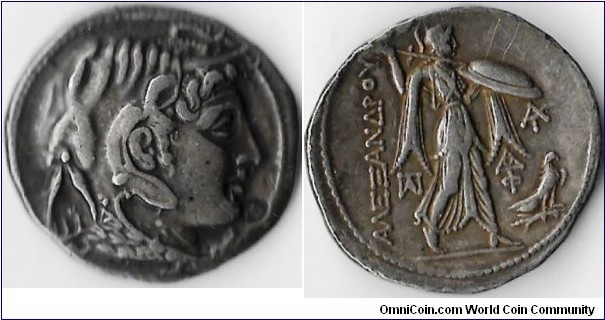
-
an early (and scarce) one from the reign of Louis XV struck for the `assureurs generales' syndicate based in Paris in 1754
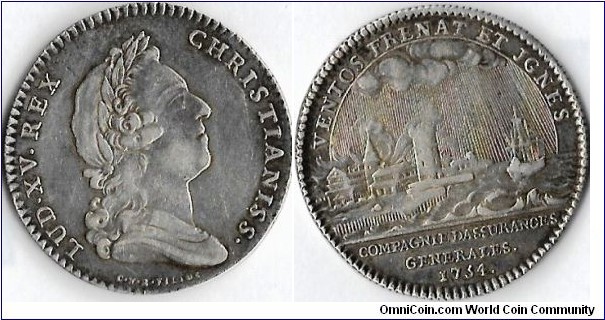
This one was struck a few years earlier (1742) for the maritime assureurs of Rouen
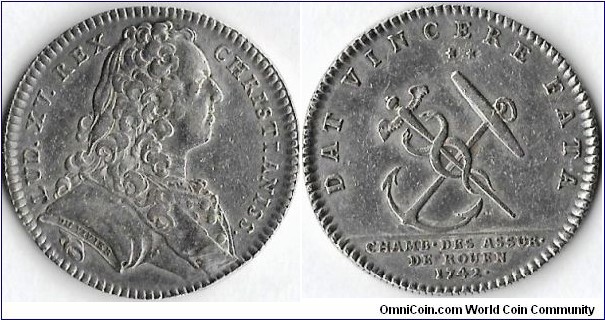
-
This one doesn't come on the market very often `les Deux Poles'. The strike is very three dimensional and the engraving of the sterns of the two ships is quite detailed.
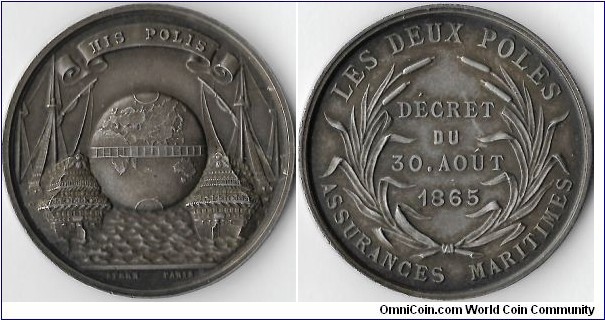
-
The images produced by the scanner are.....well keeping from using anglo-saxon.....let's just say `pretty poor'.
 The jetons are generally quite lustrous, but this isn't picked up by the scanner, and it does not deliver any depth at all. Sadly, I don't have the time /energy for real photography but may end up digging my camera out and getting some practice in!
The jetons are generally quite lustrous, but this isn't picked up by the scanner, and it does not deliver any depth at all. Sadly, I don't have the time /energy for real photography but may end up digging my camera out and getting some practice in!
-
another maritime assurer. This one struck in 1868 for `La Mer'
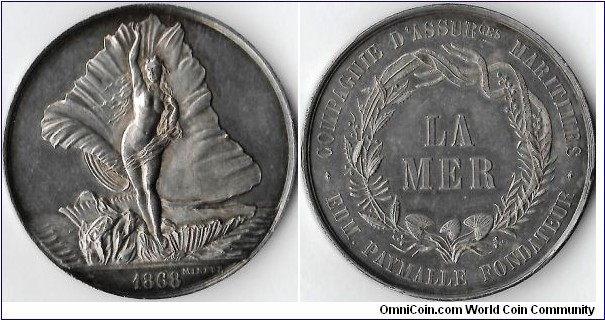
-
this one was struck for the French maritime assurer `L'Eole'.
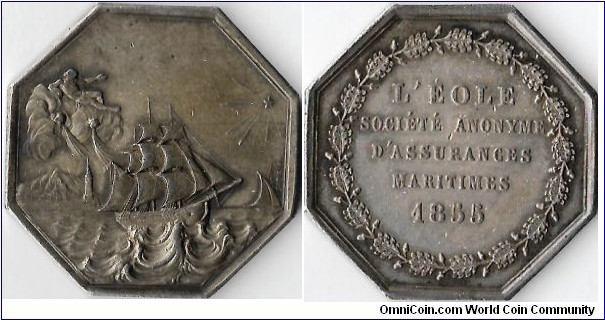
-
i've finally managed to figure out my new scanner.....almost.
Here's a relatively difficult to find silver jeton /medalet issued by the Lloyd maritime assurance syndicate in Marseille
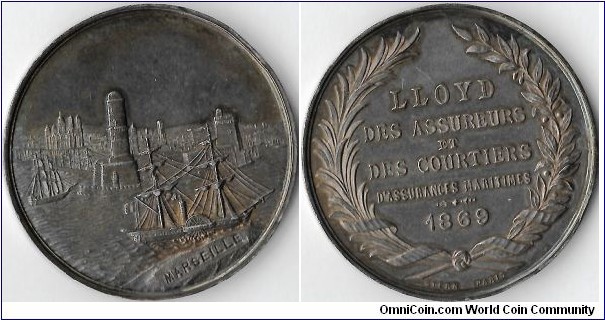
-
Ah.........THAT is a very good question.....not so sure that anyone has a definitive answer though.. Apologies in advance for my musings below:
First, to give a little `lineage' to this:
Damianus Krauwinkel was noted as a `master' rechenpfennigmacher in 1543. His passing was recorded in November 1581
Hans Krauwinkel I (the first) was a brother of Damianus. He became a `master' in 1562 and died in 1586
Hans Krauwinkel II (the second) was a son of Damianus. he became a `master' in 1586 and died in 1635
Egidius Krauwinkel was also a son of Damianus. he became a `master' in 1570 and died in 1613.
In June 1583 Egidius was recorded as striking rechenpfennigs bearing a crowned French shield. After his brother HK II
was appointed `master' in 1586, some jetons were struck bearing the signatures of both Egidius and HK. It could well be concluded that HK II also made use of dies produced by Egidius for his own issues (?).
Kilian Koch is not cited anywhere until an entry in the Book of the Dead, dated12th June 1599, which noted the passing of his wife `Clara' and made mention of him as being a rechenpfennigmacher. Jetons attributed to him span 1587 -1594. As we know, he used the signature `CK' ......excepting those times when he clearly didn't
 .
.Now add into the mix a certain Conrad Koch, recorded in the Book of the Dead on 3rd July 1617 as `Spengler und Rechenpfennigmacher'. I have no idea as to whether KK was his son, or a cousin or a contemporary. However, jetons bearing the simple signature `CK' could possibly have been struck by either maker (?)
The Schultzes (Hans I and his son Hans II) also produced jetons bearing a crowned French shield from their workshop in the early 1580's, but the design is slightly different to the one on the jeton in question (no collar). These were struck with both `Pietate et Iustitia' legend AND `Pietat et Iustitia'.......
All of the foregoing could in theory have had `input' to the making of the pieces in question
Mitchiner attributes the `Pietate' legend with the shield obverse and the two `figures' reverse to HK II and in 1588/9..... but there is no listing of the jeton with the reverse style / legend.
If we could get an attribution for the two soldiers reverse we could probably gain more certainty as to the actual manufacturer.
Hans Krauwinkel II and Kilian Koch both used the services of the Maler firm as engravers for their dies, so there are similarities to themes for some of their issues of the late 1580's. Both were involved with Franco- allegorical style jeton making
Next, lets look at the Actual `french' jetons of the period that have relevance:
Under Charles IX : `Pietate et Iustitia' (shield of France obverse).
1562 (Conseil du Roi) : two females
1563 (Chambre des Comptes) :two columns
1564 (Conseil du Roi) : King David
1564 (Chambre des Comptes) : `CC' / branches
1565 (Chambre des Comptes) : `CC' / cornucopia
1567 (Ville de Paris): Shield and columns
1568 (Chambre des Comptes) : Shield and columns
1574 dated (No department cited): `aut vinci aut mori' legend, but `horseman' depicted
There are seven other types of regal jeton struck (general issues) with the Pietate legend and shield of france obverse but none with the `warriors'.
Under Henry III : `Pietate et Iustitia' (shield of France obverse)
1574 dated (No department cited) : `aut vinci vos aut mori ' legend, but `horseman' depicted. The same reverse was also used that year with the Obverse legend Henricus III DG Fran et Pol Rex. That jeton was also dated.
The regal jetons all appear to have been dated
Not conclusive by a long shot, but it looks to me that a rechenpfennigmacher (probably either HK II or Killian Koch) got pretty good service from the the Malers for the engraving work done on the first jeton.
Now i am compelled to dig out my own early jetons to see if I have any of the types in question.


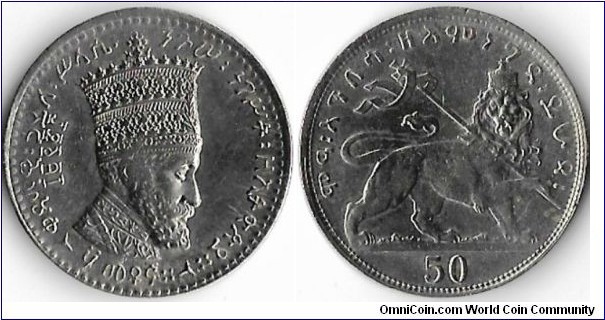
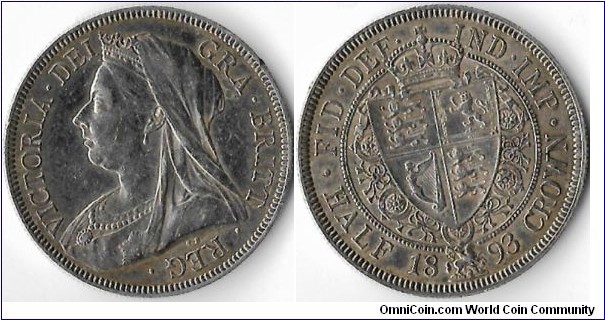
Numismatique de L'Assurance
in Exonumia (Tokens, Medals, etc) Forums
Posted
this one was struck for `La Nantaise' (fire risk)